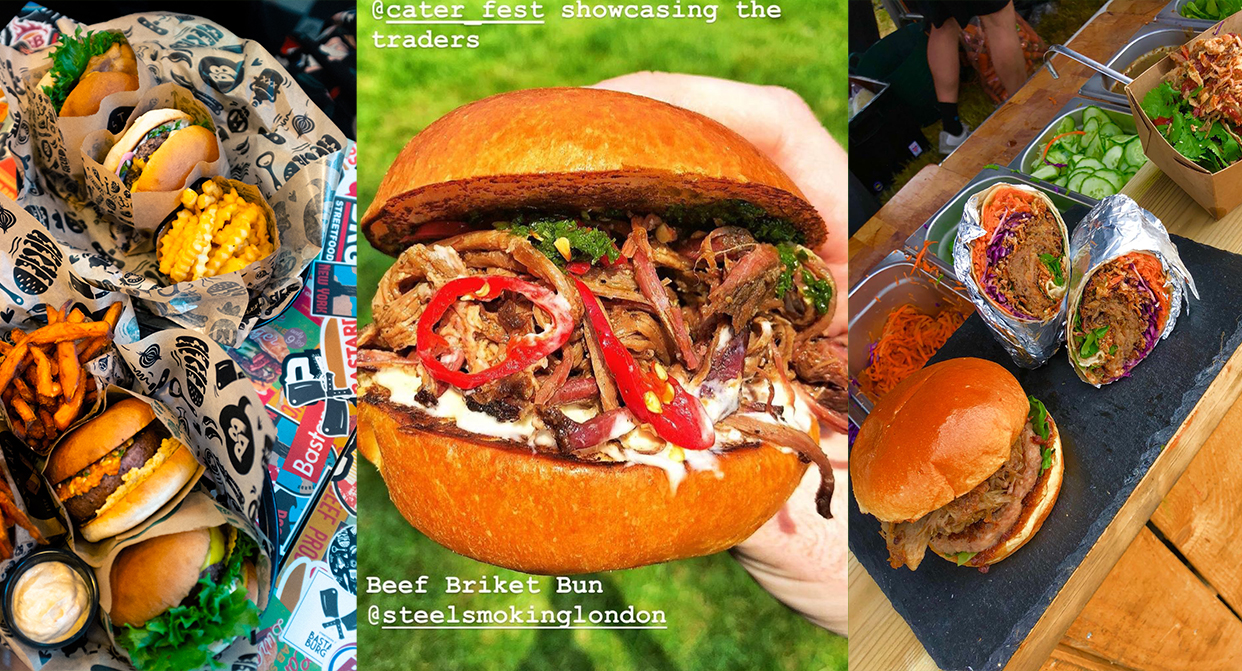With three decades’ experience in the festival industry, few have as much knowledge or experience in events as D&J Catering, and even fewer have witnessed such progress in their industry in that time. Working in both catering and concession management, the team have helped to curate a festival industry that has much greater order and usability than it did 30 years ago and have been at the forefront of changes in everything from food hygiene laws to cashless technology. We recently sat down with the team to discuss food, festivals, and everything in between.
Hi guys, thanks for talking to us today. Take us back to the very beginning, where did it all start?
Dave: We started off with a small donut unit, trading at car boot sales. After a while we bought a second unit and expanded into seasonal events. We eventually ended up with three units and began trading at well-known events like Silverston.
Can you paint a picture of what the industry was like back then?
Dave: Almost everything was different – there were very few regulations and traders didn’t have specialist uniforms or hats, people would smoke in the units, it was all very similar food types – burgers etc; and of course, we had no mobile phones, so if you had an emergency, or you were out of stock, you were in search of a phone box. There was no vegetarian or vegan options back then either, and no one was thinking about sustainability or recycling.
It’s hard to that image with the industry we know today. Is it fair to say that things have changed for the better?
Yes, definitely. Vendors are (mostly) so well prepared now. And we really like the evolution into cashless that we’re seeing now. We know some caterers have reservations about it, but we like it.
For those who don’t know, or might not have worked with a concession management company before, can you tell us a bit about what you do?
We have a lot of responsibility, siting caterers and ensuring they’re happy with their pitches, but our job is also to maximise revenue on site – a big part of this is ensuring that your caterers are happy, because otherwise they’re not going to come back to the event the following year. We’re also focused on the product and try to have as much local, fairtrade produce on sight as we can – we only want quality produce on site.
How are festivalgoers’ expectations different to what they were previously?
I’ve been doing Creamfields for 30 years and when I started, all people wanted was burger and chips. What people want also depends on the events – veggie and vegan traders aren’t likely to do that well at Creamfields, whereas they’ll do brilliantly at Glastonbury.
Part of your role as concession managers is to curate and site caterers. For our members who are currently preparing for the 2022 season, how can they prepare so that both of your jobs are made easier?
Trevor: The biggest problem we have year on year is collecting the documents. I wish everyone was a part of NCASS – it makes our lives so much easier when they are. Every year, the documents traders need to be compliant, seems to grow. It’s around 25 documents this year, and with sustainability and carbon footprint coming in, it’s only set to increase.
How do caterers benefit from working with you?
Our onsite team is available 24/7, it’s important for caterers to have someone they can go to, and that’s one of the things that sets us apart from other promoters. We help with everything from signage to where you can hire a fridge unit. A lot of our traders have been with us for 20 or 30 years, which hopefully says something. We’re also very invested in safety. We check every stall to make sure it’s gas safe, even at the big events.
What advice would you give to people who are just getting into festival catering, or are interested in doing so?
Think about whether it’s correct for you. What experience do you have with festivals? How quickly can you sell your food? The conversation needs to be had about whether a caterer has the capacity to cater for those numbers. We won’t take money from just anyone, we want to make sure people can operate successfully. Find your market in terms of what you want to sell and what you want to do. The most interesting businesses are the ones that tell a story.
What are the most challenging things about working on Greenfield sites?
Autumn: Weather, trying to site in the rain is awful, tents can flood and it’s awful, but when it’s sunny it’s fine. The hours are hard it can be 18 hours straight for 5 days in a row, but when it’s winter you get bored and can’t wait for it to start up again. You build bonds with people as well and by the end of the summer you’ve all been through it together.
Trevor: Autumn has extra challenges making sure making people adhere to health and safety and breaks and times off and making sure they are all safe.
What should people do if they want to work with you?
Apply on our website (email) or on our socials; Instagram and Facebook are monitored. We tend to go from there and see what their experience is and what they want from the job. We’re even on tik tok; some of the staff make fun videos to put on there, they end up taking it over.
What are you most looking forward to this summer?
T: The end of it! I shouldn’t say that. Back to the greenfield for me, seeing people we haven’t seen for a while; it’s not just a working relationship it’s a community as well.
A: the excitement of it, I love seeing an empty field come together into a festival
What do you love most about the industry you work in?
T: It’s giving a service to the event. The people who buy the tickets aren’t going just for the one reason, but for the whole experience they get form the food, the atmosphere, the aesthetic of the festival…
A: I think it’s the atmosphere and traveling around the country with friends, like they say, you never have to work a day in your life if you do what you love.









 Featured Training
Featured Training
OUR MEMBERSHIP
We're here to help make your catering business a success. Whether that be starting up or getting on top of your compliance and marketing. We're here to help you succeed.
Want our latest content?
Subscribe to our mailing list and get weekly insights, resources and articles for free
Get the emails